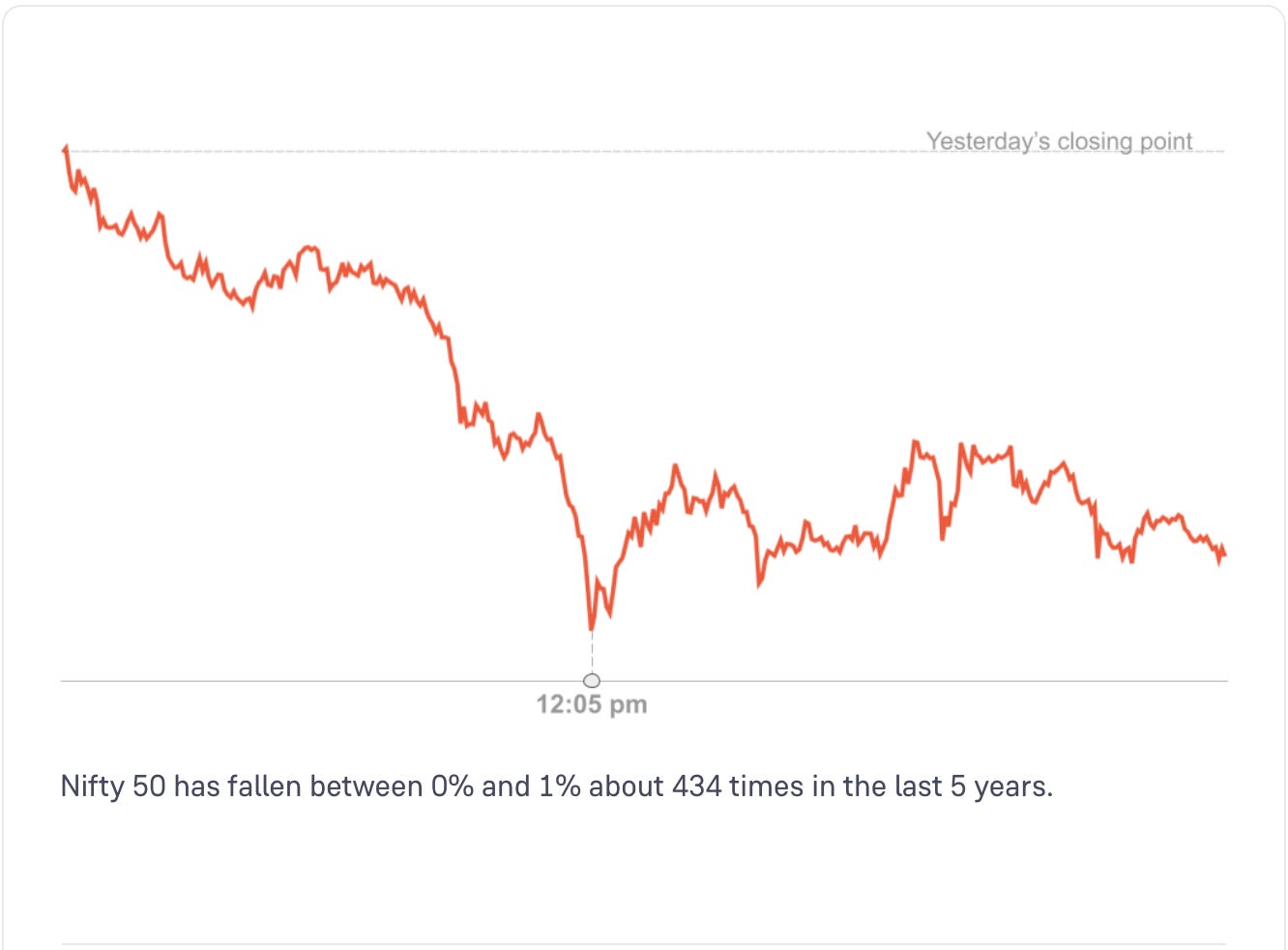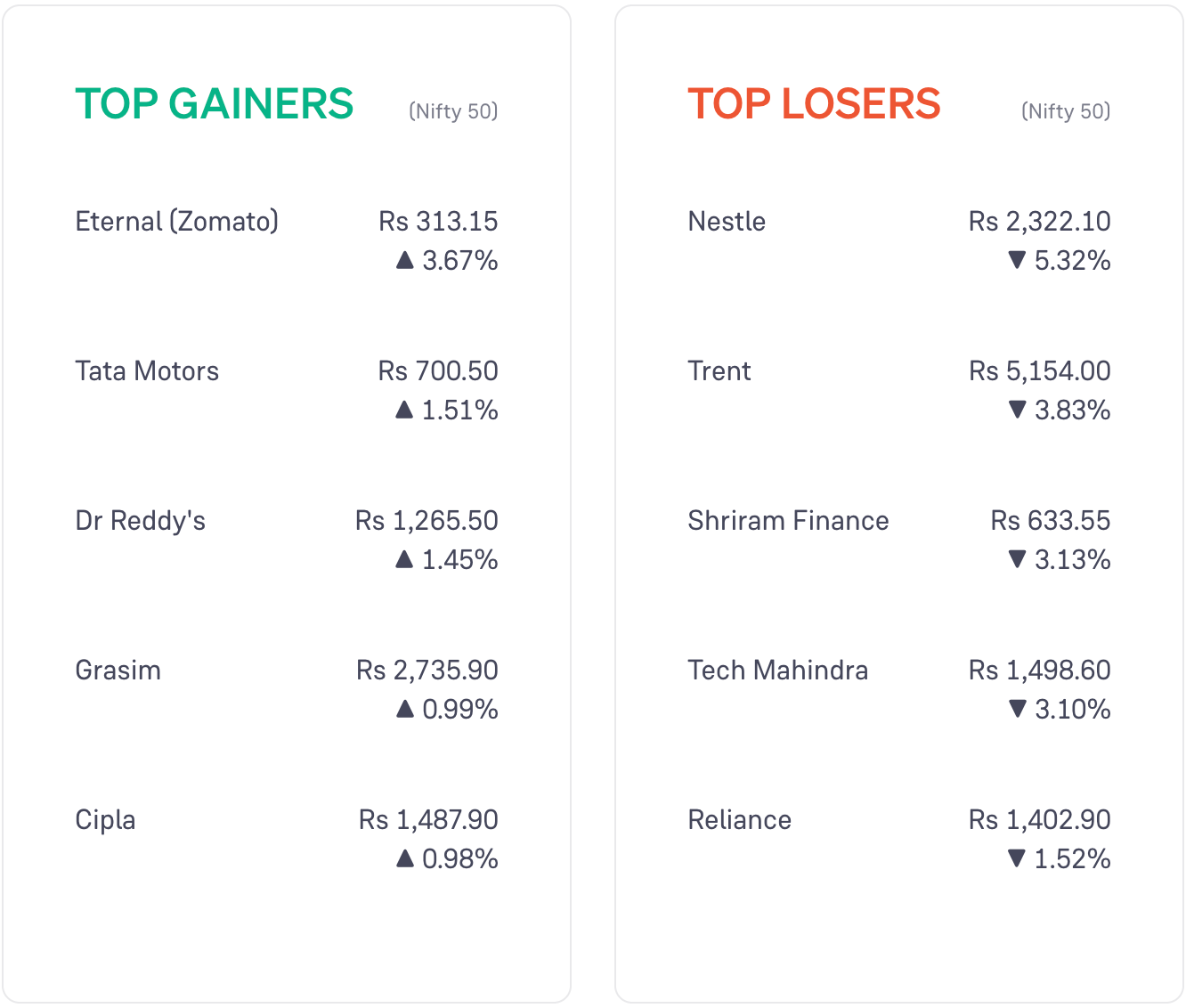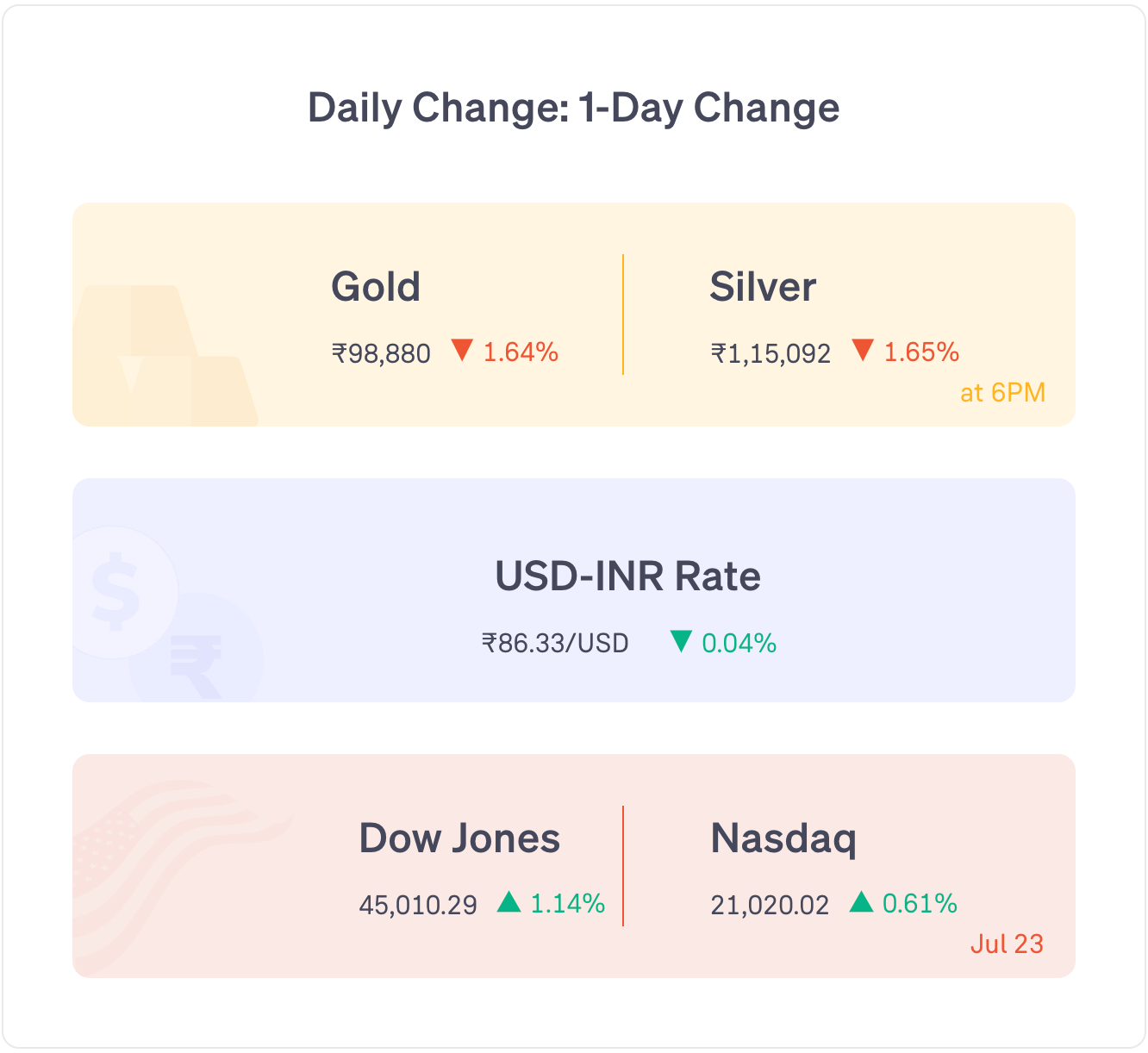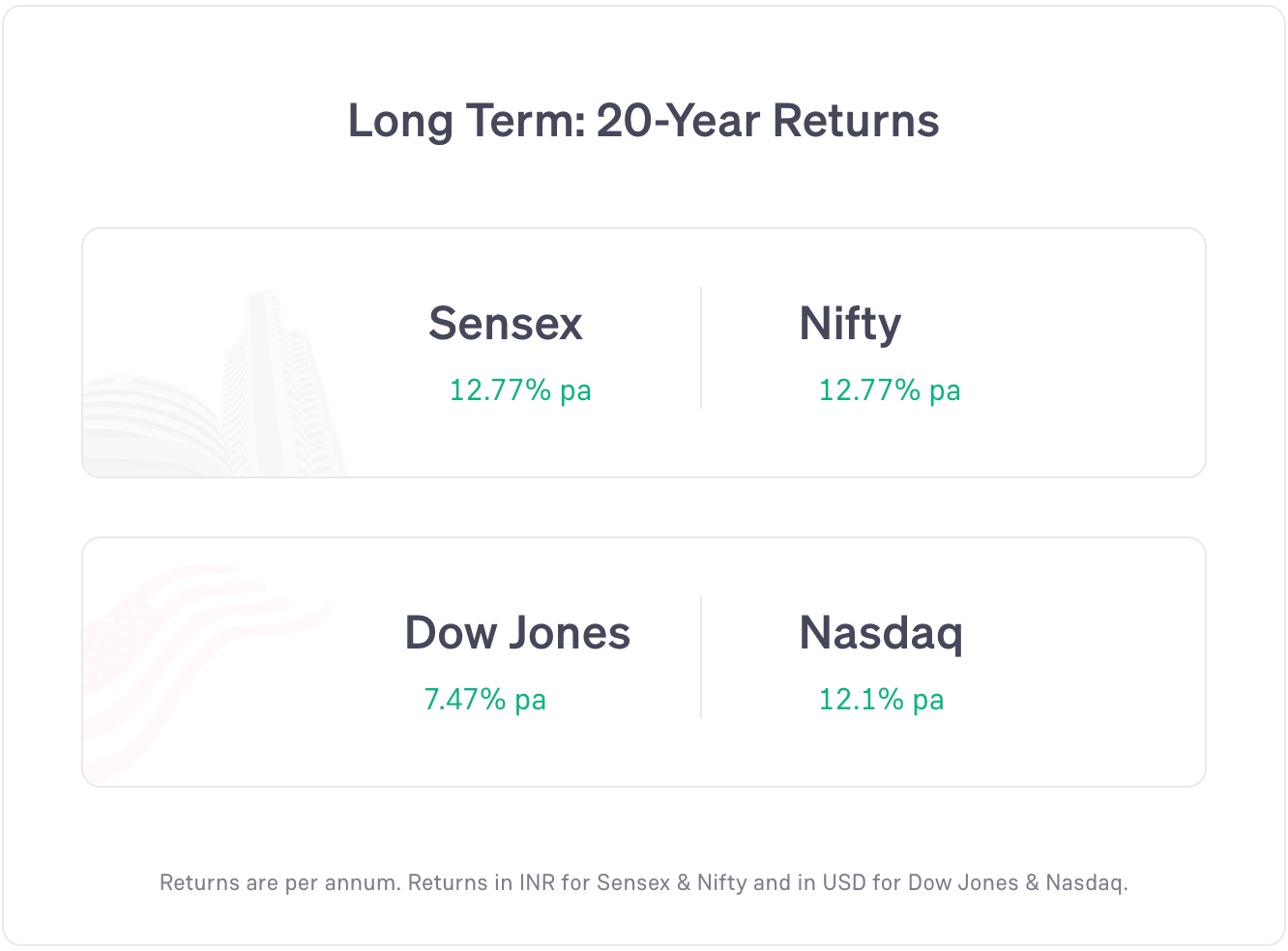India-UK FTA, FDI inflows fall, Bajaj Finance profits up 20%, & more — Daily Digest
Thursday, 24 July 2025
Markets opened very close to yesterday’s closing point.
Nifty 50 fell in the first half of the day and closed in red.
PSU stocks and healthcare stocks rose the most today. IT stocks and FMCG stocks fell the most.
Global markets: US markets rose. Most European and most Asian markets closed in green.
News
India and the UK signed a Free Trade Agreement (FTA), aiming to boost bilateral trade by $34 billion annually. The FTA includes tariff cuts and improved market access on both sides.
India’s composite PMI (manufacturing + services) fell to 60.7 in June (vs 61 in May). This means economic activity grew less in June than in May. Manufacturing PMI rose to 59.2 (vs 58.4 in May). Services PMI fell to 59.8 (vs 60.4 in May).
India’s net FDI inflows fell 98.2% year-on-year to $40 million in May (vs $3.9 billion in April). Gross FDI inflows fell 11% to $7.2 billion (vs $8.7 billion in April).
Executive Centre India applied for a Rs 2,600 crore IPO with SEBI.
Brigade Hotel IPO was subscribed 0.63 times. Retail Subscription: 2.50 times. IPO closes on 28 July.
Indiqube Spaces IPO was subscribed 2.54 times. Retail Subscription: 6.90 times. IPO closes tomorrow (25 July).
GNG Electronics IPO was subscribed 26.93 times. Retail Subscription: 23.02 times. IPO closes tomorrow (25 July).
Stocks Updates
Bajaj Finance: net profit rose 20% year-on-year to Rs 4,700 crore in the April-June quarter.
Nestle: net profit fell 13% year-on-year to Rs 647 crore in the April-June quarter.
SBI Life: net profit rose 14% year-on-year to Rs 594 crore in the April-June quarter. Net premium income rose 14% to Rs 17,179 crore.
CG Power: net profit rose 12% year-on-year to Rs 269 crore in the April-June quarter.
REC: net profit rose 29% year-on-year to Rs 4,466 crore in the April-June quarter. Dividend announced: Rs 4.60 per share, with record date: 1 August.
Adani Energy: net profit rose to 512 crore in the April-June quarter (from a net loss of Rs 824 crore in the same quarter previous year).
Canara Bank: net profit fell 21% year-on-year to Rs 3,195 crore in the April-June quarter. Net NPAs fell to 0.63% (from 1.24% previous year).
Indian Bank: net profit fell 11% year-on-year to Rs 2,276 crore in the April-June quarter. Net NPAs fell to 0.18% (from 0.39% previous year).
Wipro: signed a multi-year contract with Saudi Electric Company National Grid SA to improve their meter data platform, operational efficiency, and risk management.
Sun Pharma: company’s US subsidiaries, SPII and Taro, have agreed to pay $200 million to settle claims in an antitrust lawsuit over generic drug pricing, without admitting wrongdoing.
Word of the Day
Concentration Risk
It is the risk of losing money that arises when all or most of your money is put in only one type of investment
This can be investment in one stock, one sector or one type of asset.
If that stock/sector/asset performs poorly, your entire portfolio will suffer.
Example: a person only invests in auto stocks. If the sector slows down, their entire portfolio may fall in value. The person may have to face losses, especially with no other investments to fall back on.
Concentration risk can be reduced by diversifying investments.
This risk can also arise from having a few concentrated investments, and not just one concentrated investment.
6 Day Course
Theme: allocating monthly income
Day 4: Thursday
So far, we have discussed investing, EMIs, rent, and building emergency funds.
Depending on how you allocate your finances, you should now be left with around 20-60% of your income.
You have to take out the cost of essentials like food and transport from this.
If you are paying a vehicle loan EMI, that will be counted as part of transport. If you are using cabs or public transport, that will also come under this.
Ideally, this should be a small portion of your total income. Maybe 10-15%.
The same goes for essentials like food and health — around 10-15%.
Featured Question
Q. “Like Equity, intraday and IPO's what all investment options do we have? It's really hard to categories them, please simplify this..”
You can think of it in 3 main categories:
-Loans
-Businesses
-Tangible Assets
Loans (or debt):
You can earn money by giving it to someone and asking them to pay interest on it.
Whenever you invest in FD, you are basically lending your money to the bank. The bank has to return the full amount and interest.
Investing in bonds is another example of this. You are giving the bond issuer a loan.
All kinds of fixed-interest investments fit in this: PPF, government bonds, etc.
If choosing bonds seems difficult or time consuming, you can invest in debt mutual funds.
Businesses (or equity):
You can run a business yourself and earn money from that.
Or you can buy shares in someone else’s company.
This is a very wide range. You can buy shares on the share markets. That is called investing in listed shares.
Then there’s the unlisted space — if you invest in a company that is not listed on the share markets.
If you invest in a friend’s business, that is investing in an unlisted company. If you invest in a start-up, that is another example of unlisted shares.
If choosing shares seems difficult or time consuming, you can invest in equity mutual funds. They invest in shares of listed companies.
Or, you can invest in private equity funds, alternate investment funds, venture funds, etc — they will invest your money in unlisted companies and start-ups.
Further, stocks have derivative products like futures and options. These can also be invested in by those who have the knowledge.
Tangible assets:
This is a very wide category.
It includes assets like real estate such as land, flats, commercial property, etc.
It also includes commodities like gold and sliver.
If you are skilled and knowledgeable in sectors like crude oil, copper, agricultural products, etc, you can invest in these assets also.
Similar to how equity mutual funds invest in shares, there are funds that invest in real estate. They are called REITs or Real Estate Investment Trusts.
There are other commodities too that are more niche. It includes everything from paintings, rare artefacts, horses, vintage cars, watches, collectibles, etc.
Then there are even more niche investment options like website domains, intellectual property like patents, copyrights, trademarks, etc.
Niche categories of investments usually require specialised knowledge. Only people skilled in those sectors invest in them.
Did you like this edition?
Leave a feedback here!







Groww is the worst app for trading with no advanced trading tools, improper placement of tabs on the top. They even charge brokerage on equity delivery. No broker with common sense will bring upi app in the trading app